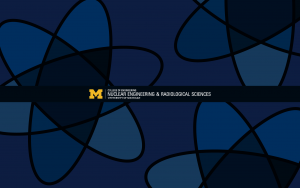Presented By: Nuclear Engineering & Radiological Sciences
NERS Colloquia: The Power of Neutron Fluctuation Analysis—an Overview and Some Recent Developments
Imre Pazsi, Chalmers University of Technology, Division of Subatomic, High Energy and Plasma Physics, Sweden

Abstract
Due to the branching character of neutron transport in multiplying media (particle production by fission), neutron reactions and numbers are correlated in space and time. Hence the statistics of the neutron distribution become non-trivial (non-Poisson), and each statistical moment (mean, variance etc) carries independent information. This wealth of information was originally used only to determine subcritical reactivity during start-up (Feynman-alpha method) from the first two moments of the detector counts. However, the number of applications and corresponding new methods has exploded in the last two decades with new areas such as neutron fluctuations in accelerator driven systems (ADS) and multiplicity counting of neutrons and photons for nuclear safeguards, including developments in the detection statistics.
The talk will give an overview of both the principles of the methods, including an essay on the forward and adjoint forms of the master equations and their moments, as well as of the latest developments and applications, such as using fluctuations in the detector current to replace pulse counting techniques. This latter means that the statistical information of discrete underlying events can be unfolded from the continuous random processes which they induce. One advantage of such a method is that it is free from the dead time problem, present in pulse counting techniques. Thus the application area can be extended to high count rate processes, such as multiplicity measurements of high activity spent fuel or reactivity measurements by the Feynman- or Rossi-alpha methods in power reactors.
Bio
Imre Pázsit is full professor at the Department of Physics, Division of Subatomic, High Energy and Plasma Physics, Nuclear Engineering Group, at Chalmers University of Technology, Göteborg, Sweden. His research interests are transport theory of neutral and charged particles; fluctuations in neutron transport and atomic collision cascades; theory of multiplicity in nuclear safeguards; reactor diagnostics based on noise analysis including diagnostics of two-phase flow; elaboration of inverse methods in neutron noise diagnostics; intelligent computing methods such as artificial neural networks and wavelet analysis, and, recently, fractional kinetics and fractional diffusion processes.
Prof. Pázsit has published over 210 articles in international journals. Together with L. Pál, he authored the book “Neutron Fluctuations – a Treatise on the Theory of Branching Processes”, Elsevier (2008). He is a Fellow of the American Nuclear Society, a Member of the Royal Swedish Academy of Engineering Sciences, and the fourth recipient of the Leo Szilard Medal of the Hungarian Nuclear Society (2016). He is also Honorary Editor of the Elsevier journal “Annals of Nuclear Energy."
Due to the branching character of neutron transport in multiplying media (particle production by fission), neutron reactions and numbers are correlated in space and time. Hence the statistics of the neutron distribution become non-trivial (non-Poisson), and each statistical moment (mean, variance etc) carries independent information. This wealth of information was originally used only to determine subcritical reactivity during start-up (Feynman-alpha method) from the first two moments of the detector counts. However, the number of applications and corresponding new methods has exploded in the last two decades with new areas such as neutron fluctuations in accelerator driven systems (ADS) and multiplicity counting of neutrons and photons for nuclear safeguards, including developments in the detection statistics.
The talk will give an overview of both the principles of the methods, including an essay on the forward and adjoint forms of the master equations and their moments, as well as of the latest developments and applications, such as using fluctuations in the detector current to replace pulse counting techniques. This latter means that the statistical information of discrete underlying events can be unfolded from the continuous random processes which they induce. One advantage of such a method is that it is free from the dead time problem, present in pulse counting techniques. Thus the application area can be extended to high count rate processes, such as multiplicity measurements of high activity spent fuel or reactivity measurements by the Feynman- or Rossi-alpha methods in power reactors.
Bio
Imre Pázsit is full professor at the Department of Physics, Division of Subatomic, High Energy and Plasma Physics, Nuclear Engineering Group, at Chalmers University of Technology, Göteborg, Sweden. His research interests are transport theory of neutral and charged particles; fluctuations in neutron transport and atomic collision cascades; theory of multiplicity in nuclear safeguards; reactor diagnostics based on noise analysis including diagnostics of two-phase flow; elaboration of inverse methods in neutron noise diagnostics; intelligent computing methods such as artificial neural networks and wavelet analysis, and, recently, fractional kinetics and fractional diffusion processes.
Prof. Pázsit has published over 210 articles in international journals. Together with L. Pál, he authored the book “Neutron Fluctuations – a Treatise on the Theory of Branching Processes”, Elsevier (2008). He is a Fellow of the American Nuclear Society, a Member of the Royal Swedish Academy of Engineering Sciences, and the fourth recipient of the Leo Szilard Medal of the Hungarian Nuclear Society (2016). He is also Honorary Editor of the Elsevier journal “Annals of Nuclear Energy."